Turkey's Crackdown on Journalists Is Everything Wrong With the Country Right Now

Can Dündar, the editor of Turkey's oldest and progressive newspaper Cumhuriyet, was in court Monday morning after he incited official opprobrium for helping make a documentary on corruption in the Turkish government.
Dündar also faces espionage charges along with Cumhuriyet's Ankara bureau chief, Erdem Gul, because they published a video appearing to show Turkey's intelligence agency providing Islamists in Syria with weapons under the guise of providing humanitarian aid.
Turkish President Recep Tayyip Erdogan is cracking down on free speech as he becomes increasingly autocratic.
Erdogan's ruling Justice and Development Party, known locally as the AKP, was seemingly innocuous when they first came to power in 2002. Erdogan started off as congenial and ostensibly egalitarian — for example, he attempted to smooth relations with the Kurds, who posed a threat to modern-day Turkey's sovereignty in their fight for an independent nation. He also did wonders for the economy, which was contracting when he came to power.
However, over the course of his 14-year rule, he's became more and more authoritarian. Impeding free speech and cracking down on the press is just one example of this.
Now Erdogan has taken his megalomania to the next level by trying to censor media internationally.
On local television, German comedian Jan Boehmermann read a satirical poem about Erdogan on March 31. By April 12, the Turkish president had filed a formal request for the comedian to be charged under a technicality in German law, which would allow Boehmermann to be jailed for insulting a head of state (Germany plans on repealing the law in 2018).
To the shock of many, German Chancellor Angela Merkel gave the requisite permission for prosecutors to be able to consider pursuing charges.
The whole affair involved layers of posturing from every party involved: Erdogan was attempting to expand his authoritarian reach; Merkel needed to maintain good relations with Turkey in order to preserve their tenuous refugee agreement; Boehmermann was making a point about the limits of free speech.
Turkey's issues go way beyond media censorship — they involve the Syrian civil war and the Islamic State group, too.
Once known for its secularism, instilled by the founding father of modern-Turkey, Mustafa Kamal Ataturk, the country has become non-secular under Erdogan. Some argue this has made the government more sympathetic to radical groups. More crucially, the AKP originally found an ally in ISIS after it became apparent they shared enemies: Both Turkey and ISIS want to quash the Kurds and Syrian President Bashar al-Assad.
"The AKP and the Turkish government under the AKP was the midwife of ISIS," David L. Phillips, director of Columbia University's Program on Peace-Building and Rights and a regional specialist, told Mic in October.
"It may have buyer's remorse, but it plays a huge responsibility for supporting jihadis and radicalizing the battlefield in Syria," Phillips added.
This is all to say the scapegoating of Dündar is but the tip of the iceberg for Turkey's problems — problems which appear to be increasingly unsustainable.